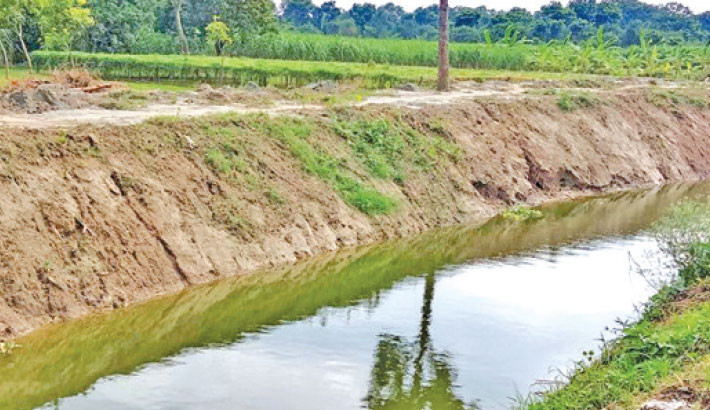News Flash
News Flash

By Md Aynal Haque
RAJSHAHI, Aug 29, 2025 (BSS)- Barind Multipurpose Development Authority (BMDA) has been promoting canal water irrigation to lessen the gradually mounting pressure on the groundwater resources in the water-stressed region, particularly the Barind area.
BMDA's canal irrigation involves re-excavating derelict canals and ponds to conserve surface water from rivers like the Padma, thereby reducing pressure on underground water and expanding irrigation in the Barind region.
According to the BMDA sources, the primary goal is to reduce reliance on groundwater by re-excavating existing ponds and canals to store and utilize surface water from nearby rivers.
Agriculture Secretary Dr Mohammad Emdad Ullah Mian visited some points of the projects to see for himself activities and progress of those in Rajshahi and Chapainawabganj districts on Thursday. He also exchanged views with the beneficiary farmers.
BMDA Executive Director Tariqul Alam, Director General of the Department of Agricultural Extension (DAE) Saiful Alam, its Additional Director Dr Azizur Rahman and BMDA Additional Chief Engineers Shamsul Huda and Dr Abul Kashem and Superintending Engineers Mahuzur Rahman, Nazirul Islam and Shibir Ahmed accompanied him during the visit.
Currently, the "Extension of Irrigation in Barind Area through Conservation of Water in Canal - second Phase" is being implemented with the goal of expanding irrigation by effectively conserving and utilizing surface water from rivers like the Padma and Mohananda.
The project aims to irrigate 3,490 hectares of land, increase surface water usage, mitigate climate change impacts through extensive tree plantations, and improve livelihoods by boosting crop and fish production and creating employment opportunities.
Project Director Nazirul Islam Told BSS that 38.25-kilometer canal, one pond and two beels are being re-excavated besides construction of 13 submerged weirs, installation of four pontoons in rivers and repairing two others under the Taka 249.40-crore project.
In the pontoons, 26 low lift pumps (LLP) will be set up for lifting water from rivers and the waters will be conserved in canals through 72.70-kilometer 450/500 millimeter diameter HDPE pipelines.
Irrigation facilities will be ensured to 3,490 hectares of land through the conserved water through 148-kilometer pipelines with 250 millimeter diameter, 132 LLPs driven by solar power and 40 direct pumping systems.
Another project titled "Supply of Padma River's Water to Barind area for Extension of Irrigation by Double Lifting System (EIDL)" is being implemented in Godagari, Tanore and Paba upazilas in the district with an estimated cost of around Taka 548.05 crore.
It aims to utilize the Padma River water to irrigate agricultural land in the Barind area using a double lifting system.
As part of the implementation of the project, the water from the Padma River will be lifted through booster-1 and booster pump-2 pump stations from the intake point at Jote Gosaidsh Sarangpur area under Godagari upazila. The lifted water will be supplied to the nearby Dudhai canal.
To this end, 1000-millimeter diameter 18 to 20-kilometer pipelines will be installed.
River water irrigation will help 30,000 more farmers to produce 1.40 lakh metric tonnes of crops on an additional 12,500 hectares of land in the drought-prone Barind area annually.
Ultimately, the venture will lessen the present situation of acute water crisis in the vast Barind tract to some extent as the current heat wave along with the abnormal lowering of underground water has created an alarming position.
Talking to BSS, EIDL Project Director Shibir Ahmed said optimum use of surface water in the project area through development of a modern and sustainable irrigation system is the prime objective of the project.
Besides, prevention of wastage of irrigation water, increase in recharge of groundwater and production of additional crops by expanding irrigation are salient features.
On average, 120 cusec water will be supplied to the canals from rivers through high-density polyethylene, a strong and flexible thermoplastic used for various applications, including water supply, every day.
For this purpose, 120 low lift pumps will be installed by which the grassroots farmers can produce seasonal crops after bringing their new lands under cultivation round the year after the best uses of the irrigation privileges.
Upon successful implementation of the project by June 2027, the river water irrigation system will turn around 10,250 hectares of single crop area into triple crops which boost annual production of 1.4 lakh tonnes of additional crops.
He said the scheme is intended to increase the current irrigated areas through surface water in the project area from 2,012 hectares to 12,262 hectares which will contribute to reducing the pressure on groundwater to some extent.
Engineer Ahmed said the 120-kilometer derelict canals will be re-excavated toincrease the water holding capacity of the canals to provide year-round irrigation to the command areas on both sides of the canals through channelling the water of the Padma River into the canals.
"We will provide training to 600 more farmers on modern agriculture, irrigation infrastructure, and moderate use of ground and surface water," he added.